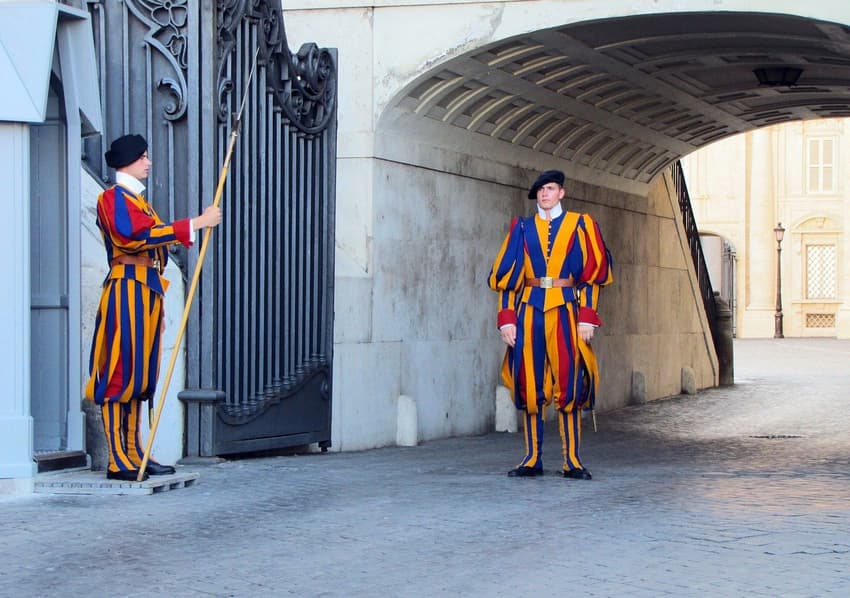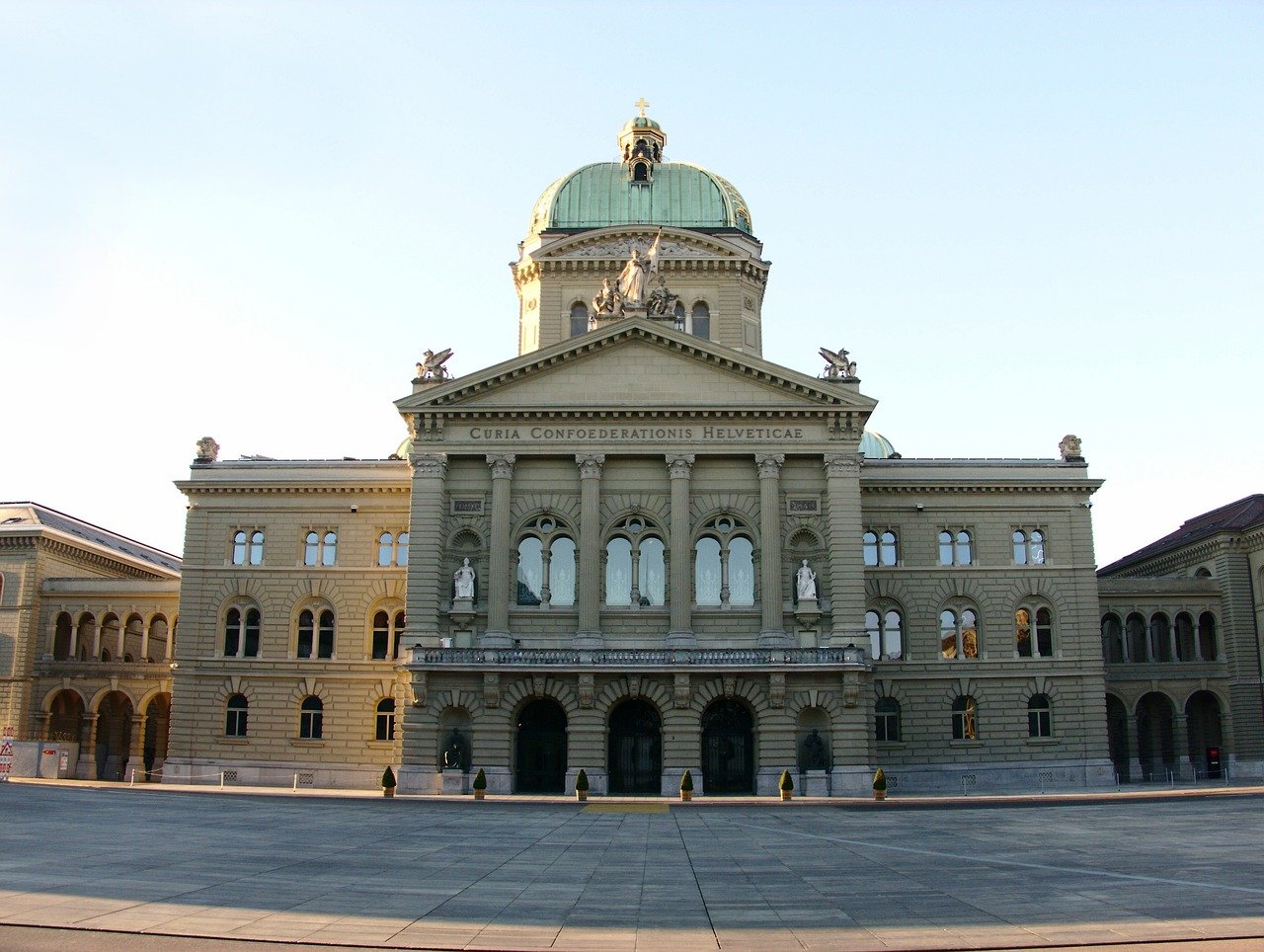How Switzerland's old boys' network preserves privilege in ways you won't see

If you don’t stay long in Switzerland, you may experience the country as a well-functioning meritocracy, but there is an ecosystem of organisations with deep historical roots that preserves privilege in invisible ways, Clare O’Dea writes.
The Swiss old boys’ network includes the guilds, the city Bourgeoise institutions – which own swathes of land and properties – male students’ clubs and various political, religious and military groupings. Their influence is discreet and all about connections.
Take the historical university associations with weighty names like Helvetia, Alemannia and Semper Fidelis. The most traditional of these clubs only accept male students, courting new members by offering fun activities combined with special advantages, like help finding accommodation.
These anachronistic clubs are known by their special colours and flags, as well as costumes, notably caps and ribbons, that are worn at parades and gatherings. Key to their philosophy is that ex-students remain on as Altherren (old gentlemen or veterans), creating a great pool of contacts for all members.
Semper Fidelis in the University of Lucerne, established in 1843, describes its Altherren as “an excellent network”. One club attached to the University of Fribourg, Alemannia, boasts of its networking value on the club website.
“At our weekly drinks meeting and other events, the 20-year-old student can meet the seasoned academic in a relaxed setting, where they can both benefit from differing life experiences. This network also encourages self-confidence among members and facilitates an easier entry into the working world.”
The individual clubs count total membership in the hundreds, but together, as revealed by the clubs’ umbrella organisation, the Swiss Students’ Association, more than 6,000 members from 70 clubs in all language regions are brought together under one banner.
The list of distinguished former members of such clubs includes Swiss presidents, government ministers, parliamentarians, federal judges, university professors and so on. It looks like the silly hats are worth it.

The Swiss parliament buildings in Bern. Photo: b1-foto on Pixabay
Influence of the untitled elite
Switzerland has no titled aristocracy but it does have an untitled elite, some of whom even own castles. Their surnames are well known – the Eschers in Zurich, the Burkhardts in Basel, the Sulzers in Winterthur, Patrys in Geneva or von Graffenrieds in Bern, among many others.
Many of these men and women are still prominent in the government, economy and cultural life of their cities and cantons. They come together in the organisations that helped secure their position over generations, the Burgergemeinde (community of burghers) and in the guilds.
Burgergemeinde, also spelt Bürgergemeinde, exist in around half of Swiss cantons. The French name is bourgeoisie or commune bourgeoise, and the Italian version is patriziato. Their role and importance vary depending on the canton or city, but they generally manage land and property for the greater good.
Thanks to the money they earn from their holdings and investments, the communities are also in a position to act as patrons of the arts or play a philanthropic role. Traditionally, members had the right to use communal forests and pastures and to take part in decision-making related to communal affairs.
Although these organisations are not designed for personal enrichment, they obviously place members in a good position to build their wealth and connections.
Guild houses traditionally place for men to gather
The guilds are the other bastion of the elite in Switzerland. Zurich alone has 26 guilds, none of which admit women members. Last year, for the first time, daughters of the guild members from one guild were permitted to march with the men at the annual Sechseläuten parade in April.
Although the guild houses were set up to represent the interests of the various crafts and professions, they have always had the side benefit of being a place for men to gather away from women. These days the networking is accompanied by a big dose of pageantry.
In terms of serving society at large, military service used to be the great leveller of Swiss men and the advancer of some. The shared experience bound men from all walks of life together, but it was also a route to career advancement.
Two generations ago, officer training was practically a prerequisite to gaining a leadership role in the economy or politics. However, thanks to the entry of Swiss women into politics and foreign men into the multinational corporate world, this alternative hierarchy no longer has anything like the same importance.
That’s not to say that certain exclusively Swiss credentials don’t bring advantages. Serving in the Swiss Guards, for example, can be very beneficial to your future career. Around 1,000 men are members of the ex-Swiss Guards association. The Catholics had an incentive to join forces in the past when the main industrialists were mostly Protestant in places like Zurich, Basel and Geneva.
READ ALSO: Why do the Swiss Guards guard the Vatican?
According to the organisation, their biennial general meeting, attended by high-ranking guests, is a wonderful opportunity to meet ex comrades from all of Switzerland, and “helps to anchor the Swiss Guard in its homeland”.
All in all, the traditional groups mentioned above benefit thousands rather than millions of Swiss citizens. But when you include the myriad of professional associations, trade unions, community- and hobby-based clubs, there are countless ways for Swiss citizens and non-nationals to network and defend their common interests.
Yet, it must be said that the most common and important privilege – voting – is open only to the Swiss, including the Swiss abroad. With a few exceptions at cantonal level, foreign nationals in Switzerland – more than a quarter of all residents – don’t have the right to vote.
Comments
See Also
The Swiss old boys’ network includes the guilds, the city Bourgeoise institutions – which own swathes of land and properties – male students’ clubs and various political, religious and military groupings. Their influence is discreet and all about connections.
Take the historical university associations with weighty names like Helvetia, Alemannia and Semper Fidelis. The most traditional of these clubs only accept male students, courting new members by offering fun activities combined with special advantages, like help finding accommodation.
These anachronistic clubs are known by their special colours and flags, as well as costumes, notably caps and ribbons, that are worn at parades and gatherings. Key to their philosophy is that ex-students remain on as Altherren (old gentlemen or veterans), creating a great pool of contacts for all members.
Semper Fidelis in the University of Lucerne, established in 1843, describes its Altherren as “an excellent network”. One club attached to the University of Fribourg, Alemannia, boasts of its networking value on the club website.
“At our weekly drinks meeting and other events, the 20-year-old student can meet the seasoned academic in a relaxed setting, where they can both benefit from differing life experiences. This network also encourages self-confidence among members and facilitates an easier entry into the working world.”
The individual clubs count total membership in the hundreds, but together, as revealed by the clubs’ umbrella organisation, the Swiss Students’ Association, more than 6,000 members from 70 clubs in all language regions are brought together under one banner.
The list of distinguished former members of such clubs includes Swiss presidents, government ministers, parliamentarians, federal judges, university professors and so on. It looks like the silly hats are worth it.

Influence of the untitled elite
Switzerland has no titled aristocracy but it does have an untitled elite, some of whom even own castles. Their surnames are well known – the Eschers in Zurich, the Burkhardts in Basel, the Sulzers in Winterthur, Patrys in Geneva or von Graffenrieds in Bern, among many others.
Many of these men and women are still prominent in the government, economy and cultural life of their cities and cantons. They come together in the organisations that helped secure their position over generations, the Burgergemeinde (community of burghers) and in the guilds.
Burgergemeinde, also spelt Bürgergemeinde, exist in around half of Swiss cantons. The French name is bourgeoisie or commune bourgeoise, and the Italian version is patriziato. Their role and importance vary depending on the canton or city, but they generally manage land and property for the greater good.
Thanks to the money they earn from their holdings and investments, the communities are also in a position to act as patrons of the arts or play a philanthropic role. Traditionally, members had the right to use communal forests and pastures and to take part in decision-making related to communal affairs.
Although these organisations are not designed for personal enrichment, they obviously place members in a good position to build their wealth and connections.
Guild houses traditionally place for men to gather
The guilds are the other bastion of the elite in Switzerland. Zurich alone has 26 guilds, none of which admit women members. Last year, for the first time, daughters of the guild members from one guild were permitted to march with the men at the annual Sechseläuten parade in April.
Although the guild houses were set up to represent the interests of the various crafts and professions, they have always had the side benefit of being a place for men to gather away from women. These days the networking is accompanied by a big dose of pageantry.
In terms of serving society at large, military service used to be the great leveller of Swiss men and the advancer of some. The shared experience bound men from all walks of life together, but it was also a route to career advancement.
Two generations ago, officer training was practically a prerequisite to gaining a leadership role in the economy or politics. However, thanks to the entry of Swiss women into politics and foreign men into the multinational corporate world, this alternative hierarchy no longer has anything like the same importance.
That’s not to say that certain exclusively Swiss credentials don’t bring advantages. Serving in the Swiss Guards, for example, can be very beneficial to your future career. Around 1,000 men are members of the ex-Swiss Guards association. The Catholics had an incentive to join forces in the past when the main industrialists were mostly Protestant in places like Zurich, Basel and Geneva.
READ ALSO: Why do the Swiss Guards guard the Vatican?
According to the organisation, their biennial general meeting, attended by high-ranking guests, is a wonderful opportunity to meet ex comrades from all of Switzerland, and “helps to anchor the Swiss Guard in its homeland”.
All in all, the traditional groups mentioned above benefit thousands rather than millions of Swiss citizens. But when you include the myriad of professional associations, trade unions, community- and hobby-based clubs, there are countless ways for Swiss citizens and non-nationals to network and defend their common interests.
Yet, it must be said that the most common and important privilege – voting – is open only to the Swiss, including the Swiss abroad. With a few exceptions at cantonal level, foreign nationals in Switzerland – more than a quarter of all residents – don’t have the right to vote.
Join the conversation in our comments section below. Share your own views and experience and if you have a question or suggestion for our journalists then email us at [email protected].
Please keep comments civil, constructive and on topic – and make sure to read our terms of use before getting involved.
Please log in here to leave a comment.